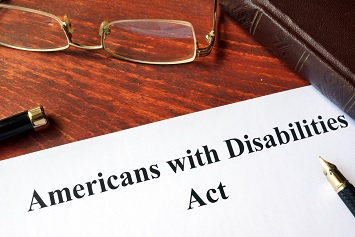Employers all over the country are responding to an unprecedented pandemic to help reduce the spread of the coronavirus. This growing public health crisis has raised many legal issues, including those related to the Americans with Disabilities Act (ADA).
During this time, many employees have requested workplace accommodations to help reduce their chances of infection, and employers have been tasked with navigating complex legal questions while maintaining a productive workforce.
This is not an easy task. This afternoon, in a live webinar, we will help guide employers through their responsibilities under the ADA—from determining whether an employee is a qualified individual to navigating the interactive process and more.
As a preview to the event, we’re providing a few examples of things to consider when offering an ADA accommodation and keeping workers safe.
Accommodating At-Risk Workers
For example, if an individual’s job can only be performed in the workplace, there may be reasonable accommodations for individuals with disabilities who are at a higher risk from COVID-19 that allows them to perform the job.
An employer could accommodate a worker’s request for limited human contact due to a disability by making changes to the work environment, such as designating one-way aisles, using plexiglass, or other physical barriers to provide distance between customers, coworkers, guests, etc.
Alternative accommodations may include temporary restructuring of marginal job duties, a temporary transfer to a different job position, or modifying an employee’s schedule. While analyzing whether reasonable accommodation is feasible, employers need to keep in mind that the accommodation only needs to be reasonable.
Accommodations Must Be Reasonable
In other words, it doesn’t have to be the best accommodation or the preferred accommodation of the employee.
Employers must also analyze whether an accommodation would pose an undue burden on the employer and also whether it would pose a direct threat to him or herself or others. Regardless, employees must go through the interactive process to evaluate all options to accommodate the employee before making any such determination.
2 More Questions Answered
How much information may an employer request from an employee who calls in sick in order to protect the rest of its workforce during the COVID-19 pandemic?
During a pandemic, ADA-covered employers may ask such employees if they are experiencing symptoms of the pandemic virus. For COVID-19, these include symptoms such as fever, chills, cough, shortness of breath, or sore throat.
Employers must maintain all information about employee illness as a confidential medical record in compliance with the ADA.
When employees return to work, does the ADA allow employers to require doctors’ notes certifying fitness for duty?
Yes. Such inquiries are permitted under the ADA either because they would not be disability-related or, if the illness were truly severe, they would be justified under the ADA standards for disability-related inquiries of employees.
As a practical matter, however, doctors and other healthcare professionals may be too busy during and immediately after a pandemic outbreak to provide fitness-for-duty documentation. Therefore, new approaches may be necessary, such as reliance on local clinics to provide a form, a stamp, or an e-mail to certify that an individual does not have the pandemic virus.
The nuances related to COVID-19 are new and all employers are now forced to deal with these questions. Our upcoming webinar this afternoon will help ease employer concerns about legal issues related to the ADA and help guide them through the interactive process to ensure that they are both complying with the law and maintaining a safe and healthy workplace.
Kara M. Maciel is a founding partner of Conn Maciel Carey and Chair of the firm’s national Labor & Employment Practice Group. She focuses her practice on representing employers in all aspects of the employment relationship. Daniel C. Deacon is an Associate in the Washington, DC office of Conn Maciel Carey LLP working in both the Labor and Employment and OSHA practice groups. To learn more about the event, or to register, click here.

